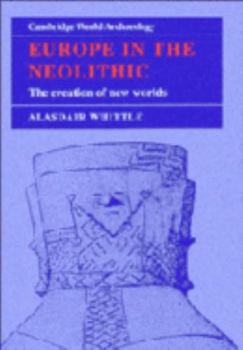Europe in the Neolithic: The Creation of New Worlds
Select Format
Select Condition 
Book Overview
Dr Whittle reviews the latest archaeological evidence on Neolithic Europe from 7000 to 2500 BC. Describing important areas, sites and problems, he addresses the major themes that have engaged the attention of scholars: the transition from a forager lifestyle; the rate and dynamics of change; and the nature of Neolithic society. He challenges conventional views, arguing that Neolithic society was rooted in the values and practices of its forager predecessors right across the continent. Only gradually did new attitudes emerge, to time and the past, to the sacred realms of ancestors and the dead, to nature and to the concept of community. Unique in its broad and up-to-date coverage of long-term processes of change on a continental scale, this revised version of Whittle's Neolithic Europe: A Survey reflects radical changes in the evidence and in interpretive approaches over the past decade.
Format:Paperback
Language:English
ISBN:0521449200
ISBN13:9780521449205
Release Date:June 1996
Publisher:Cambridge University Press
Length:460 Pages
Weight:1.80 lbs.
Dimensions:1.0" x 7.4" x 9.2"
Related Subjects
Ancient Archaeology Europe History Politics & Social Sciences Social Science Social SciencesCustomer Reviews
1 rating
Authoritative, provocative, inductive
Published by Thriftbooks.com User , 26 years ago
This book is an excellent overview of current data and interpretations for the origins of agriculture in Europe. Whittle's thesis is that, contrary to the prevailing interpretation, indigenous European foragers adopted farming and were the perpetrators of the LBK phenomenon. He doesn't necessarily prove his point with this book (and he doesn't refute the colonization model either), but he does present some interesting observations and fresh thinking on the matter. I would recommend this book to anyone with some familiarity with European prehistory; especially those with the background to weigh his arguments against the evidence.






